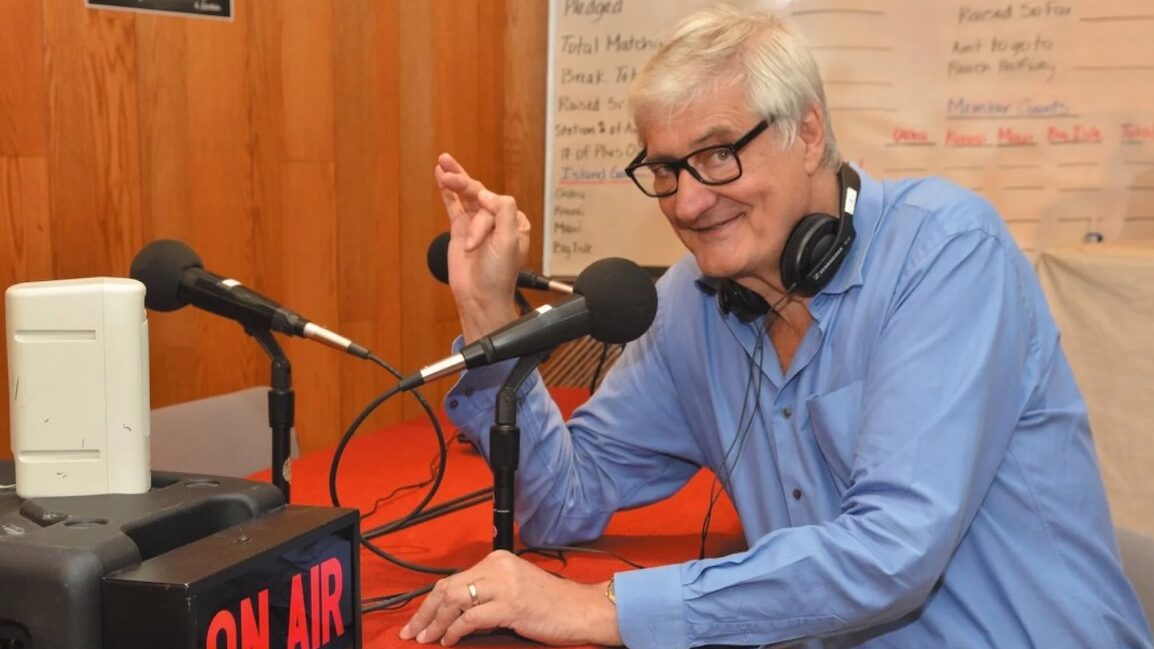Michael Titterton, longtime leader of Hawai‘i Public Radio, dies at 76

Tina Yuen / PBN
Former Hawaiʻi Public Radio President Michael Titterton during an on-air fundraising campaign.
Michael Titterton, who served as president and GM of Hawaiʻi Public Radio from 1999 to 2016, and who oversaw an expansion of HPR’s two stations across the Hawaiian Islands, died Oct. 4 at his home in Honolulu. He was 76.
Titterton was known at the station and in the community as a gregarious, enthusiastic and passionate figure. He took over Hawaiʻi Public Radio at a time of financial uncertainty and went on to nearly double the size of its membership and triple the size of its budget.
He later came out of retirement to lead the Hawaiʻi Symphony Orchestra as president. The Hawaiʻi Arts Alliance recognized him as their 2016 Alfred Preis Honoree for his lifetime support of the arts.
Titterton had a long career in public media. He came to HPR after serving as GM of public radio station WHQR in Wilmington, N.C., which he helped to build, starting in 1983 and putting it on the air the next year. Earlier in his career he helped convert college radio stations into NPR affiliates at Virginia Tech and Pennsylvania State University, where he also taught broadcasting.
Born and raised in London, Titterton earned a bachelor’s degree in communications from the University of Windsor in Canada. He later earned a master’s degree in rhetoric from Wayne State University in Detroit, where he also started working in radio, including reporting on the decline of Detroit’s automobile industry for NPR.
In addition to a background in classical music and broadcasting, Titterton maintained a lifelong fascination with automobiles, engines and mechanical engineering and loved to tinker in his metal shop. He was also an accomplished actor, appearing in productions ranging from Shakespeare to a guest role as the bartender in an episode from Season Three of Lost.
At HPR, Titterton not only masterminded and executed the roll-out of a statewide network of transmitters and translators, he was also well-known for his trademark performances of joyful exuberance during live pledge drives to raise money for the station. At one point, the station maintained a record of 15 straight years of increasing revenue during the campaigns, which eventually topped more than a million dollars apiece. While increasing numbers of regular contributors reduced the need to continually boost overall campaign goals, Titterton maintained a unique on-air presence with staff and community guests alike.
Titterton served as a mentor to a generation of broadcasters on both sides of the microphone in Hawaiʻi.
In 2014, Titterton told the Honolulu Star-Advertiser that the business model of public radio is built on factors very different from logic:
“We put together a high-quality product and we give it away for free, and then we not only make it voluntary, but people get to decide whatever it is they want to contribute. What I liken it to is … the old-time buskers outside the theaters. You know with the one-man band and the monkey who would pass the hat around. That’s kind of what we do.”
“The stories of Michael’s enthusiasm, curiosity and intellectual depth are legendary at HPR,” said Meredith Artley, current president and CEO. “The entire team at HPR is so grateful for his many years of leadership, and for the foundation he helped to create that makes HPR strong today.”
Titterton is survived by his wife Madeleine McKay of Honolulu and his brother Ian Titterton of Portland, Ore.
Plans for a memorial service are pending.








How absolutely fitting that in the same issue of Current noting Michael’s passing, should also hale the excellent work of BPR’s (WCQS, Asheville) storm coverage. WCQS’s creation and early success was due in no small part to Michael’s advice and consulting support to the first board and staff of Western NC Public Radio.
As an amazing mentor, Michael taught me everything I know about radio. In Wilmington NC, I auditioned for a play that Michael was directing. He talked to me after the audition and invited me to be part of a series of short stories that had been converted to radio plays. I ended up hosting the series and being an actor in many of the plays. That lead to him recruiting me as a volunteer for the station, and then an employee. I ended up having a wonderful 30 year career in radio — which I never expected! We also worked together in local theatre, including being onstage in a production of “My Fair Lady” (he was the ideal Professor Higgins). What a magnificent man!